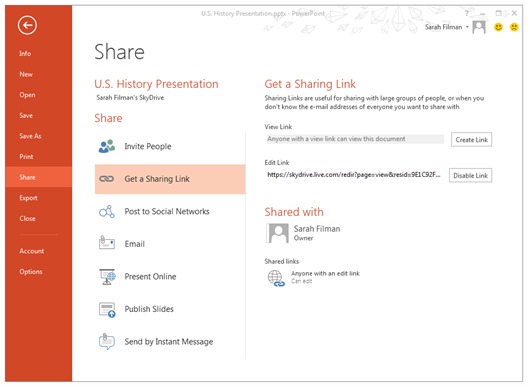Microsoft announced last week its cloud sharing service, Skydrive now hosts over 1 billion documents. Like Google Docs, Skydrive allows users to create and edit Office documents(Word documents, Excel spreadsheets, PowerPoint presentations and OneNote notebooks) via the Office Web app in a browser using a Microsoft account. To celebrate the achievement of hosting 1 billion documents, Microsoft has now announced that users can now view and edit documents saved on Skydrive without signing in with a Microsoft account.
Earlier, inviting other people to work on a shared document required them to be added as collaborators and then they had to login with their Microsoft account to access the documents. However now the process is even much simpler. When you want to share a document, simply choose between a “View link” or a “Edit link” and share the URL to the collaborators. They can now access and edit the documents via the browser or the Office application and even work on it simultaneously with other people!

Image credit: Microsoft
There are pros and cons to this strategy for Microsoft. The good thing is a person without a Microsoft account need not create one just so to access/modify a file stored on Skydrive. This will provide seamless experience for people using different cloud storage services without having to jump through a lot of hoops. The downside is Microsoft cannot add more users to its portfolio though Skydrive now that anyone can access the documents as long as they have the URL of the files. What it means to Microsoft
What it means to Google
For once, Microsoft has actually taken the lead in online document collaboration space and this should ring some alarm bells to Google. We shouldn’t be surprised if Google came out with a similar feature for Google Docs, but then Google would end up shooting itself in the foot. Google’s core business is ads and Google needs to know as much it can about its users to serve them the right ads. So if Google allowed users to access their services without a Google account, then the ads we see will be random. Shouldn’t it have been like this anyways? The answer to this question depends on user’s preferences – would they like to see ads based on their preferences or not. But it definitely will be good to have a choice.
Microsoft has taken a risk with the bold move to allow users to access their services without a Microsoft account. There is no doubt this strategy will provide a simplified experience for users but whether or not it will help Microsoft in the long run cannot be answered now.
This article has been reproduced from Sridhar’s blog.












